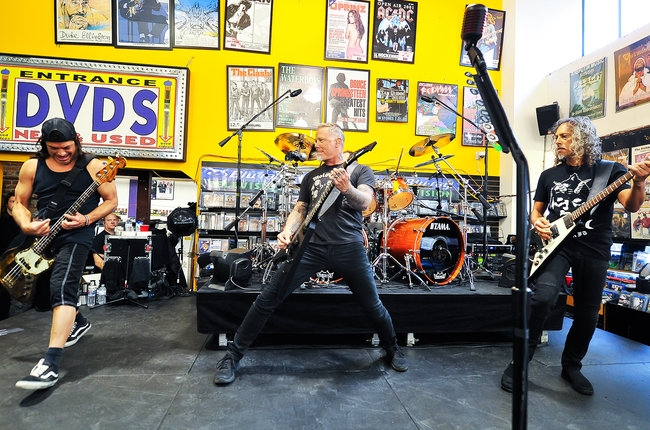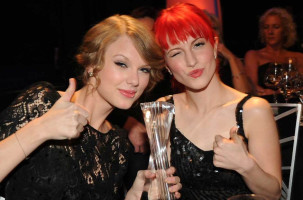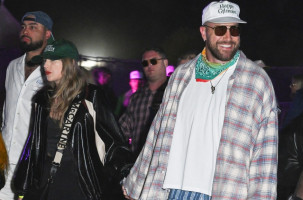First and foremost, Record Store Day is an amplification of what record stores offer year round. This one day a year gifts vinyl enthusiasts with a list of over 300 exclusive titles that can only be purchased at participating stores (each store selects what titles and how many they wish to sell). In-store performances, signings, meet-and-greets and more have all become a part of Record Store Day as well; stores that wish to participate sign the Record Store Day pledge, holding them to an honor code that says they will sell the commercial RSD releases to their physical customers, on Record Store Day, and not hold product back to later sell online.
On Saturday, April 22, Record Store Day will ring in its 10th anniversary with Annie Clark, better known as St. Vincent, as its first female ambassador. (Previous ambassadors have included Jack White, Chuck D and Dave Grohl.) In its first year, Record Store Day grew roots in nearly 100 stores across the country, offering less than 20 exclusive releases. A decade on, nearly 1,400 record stores across the United States alone, and close to 3,000 internationally, will participate; the event is now celebrated on every continent except Antarctica.
"Every year we receive an email, typically from a young couple starting their own record store [asking to get involved], and they're the new versions of record stores; they're hybrids, a record store and a cupcake shop, or a barber shop, or a bookstore... any combination of different things," Kurtz says. "To be a part of Record Store Day, we just say, 'Your core business needs to be music.'"
The concept for Record Store Day itself emerged from a similar hybrid. Aside from being a coordinating founder, Levin owns Atlanta-based Criminal Records (and has since it opened in 1991), a shop that sells both vinyl and comic books. He says the success of Free Comic Book Day, which started in 2002, helped him make a case for what a vinyl version could look like. "It was a great launching point for Record Store Day," he says.
"Eric was the one who had more experience because he actually had a comic book store," Kurtz remembers about the event's founding. "He was the first one who said, 'We should make this about vinyl.'" Kurtz admits he fought Levin on the idea at first -- mainly due to a slew of emails that all essentially asked, "Why are you doing this?" -- and soon found himself asking the same question. "But the answer was, the artists wanted it," he explains. "There's an element of romanticism, and there's no bigger reward for fans than a nice, beautiful, vinyl package. Artists like Dave Grohl and Jack White were all having the same epiphany at the same time, and [with their support] we felt more and more like, 'We can do this.'"

While getting artists on board was an easy sell, gaining trust from record store owners proved more difficult. "The artists got it, they wanted to do this, Metallica being the first one. But the record store owners were so bitter because they had just gone through this period where they were disenfranchised and pushed out," Kurtz recalls. "They assumed I was in cahoots with 'The Man.'" Colliton adds that after repeatedly stressing to store owners that they could "Make this day what you want it to be," those concerns have largely vanished.
In 2014, Josh Madell, co-owner of Manhattan's Other Music, which closed its doors last June, penned a guest post for Billboard immediately following that year's Record Store Day, which proved to be the store's best in its nearly 20-year history. "We did a week's worth of business in one afternoon," Madell wrote at the time. "Every slow Saturday cuts like a knife, so you can be sure that a day like Record Store Day feels pretty damn good going down."
Read more: 4 Weeks Premium Next Level Campaign.The Source Magazine, Hip Hop Weekly, Live radio interviews and more.
While such success wasn't enough to keep the physical storefront open, the rise of vinyl sales have in fact saved stores from closing. Kurtz recalls having dinner with two friends, Karl Groeger of New York store Looney Tunes and Rob Roth of New Jersey store Vintage Vinyl, both of whom said that had it not been for Record Store Day, their stores would not be here today. And the data backs it up: in 2015, RSD propelled indie retailers to their highest weekly sales in 12 years, boosting scans 46.7 percent over the prior week.
One of the few criticisms Record Store Day still receives -- in addition to the critique of "flippers," those who purchase exclusives only to re-sell them on eBay at a higher cost -- centers on its relationship with major labels. "[Some argue] major labels have taken over Record Store Day, and that is really annoying to me because major labels were there from the beginning," Colliton says. "Record stores sell major-label titles next to indie-label titles every day all year long, so any celebration of what they do should include both."
From its inception, Record Store Day fostered a positive relationship with one major in particular: Warner Bros. Colliton recalls how in its first year, the co-founders weren't asking labels to put anything out; it was Warner Bros. that specifically said, "Why don't we offer releases that you can only get [in the store]?" That spawned the framework still used today.
Warner Music Group's resident vinyl expert, Billy Fields -- whose official title is vp, sales and account management for WEA, the artist and label services arm of Warner Music Group -- remembers Warner being a huge supporter of Record Store Day from the beginning. "[WMG] has been pretty aggressive developing vinyl, and we're now a decade in as well," Fields says. "We ran concurrently with the format growth and with Record Store Day -- it was a brilliant idea, an amazing development of right place, right time, right solution."
In 2007, as Record Store Day was gearing up to launch, vinyl sales in the U.S. totaled 990,000, according to Nielsen Music. "We launched when there was so much bad news coming out of the record industry," says Bunnell. "Digital piracy was rampant and CD sales were declining at a rapid rate; it's hard to compete with free." Replace digital piracy with streaming -- with its ad-supported free tiers -- and that competition still rages on, but is improving.
As of 2016, vinyl sales have grown to over 13 million, according to Nielsen Music, while the RIAA reported that vinyl comprised 26 percent of all physical shipments last year -- the highest percentage since 1985. "While I'm hesitant to take all the credit and say, 'Yes, we brought vinyl back,' there is no way you can discount what Record Store Day and record stores have meant to vinyl and its resurgence," Colliton says.
"There's definitely a halo effect around Record Store Day," Levin adds. "It rewards those who have been coming back week after week, and also welcomes new customers."
StarlightPR: 4 Weeks Premium Next Level Campaign.The Source Magazine, Hip Hop Weekly, Live radio interviews and more.
In 2015, Colliton was in Raleigh, N.C. at Schoolkids Records helping prepare for All Time Low's in-store performance and signing; the band's 2015 album Future Hearts had just debuted at No. 2 on the Billboard 200. The line of well over 300 fans -- which had started forming five hours prior to the performance -- snaked around the building. "It was the first time some of these kids were at a record store," Colliton remembers. "Maybe they came back, but regardless, it was definitely something they won't forget -- and it happened at a record store."
Whereas Colliton is more reluctant to admit the impact Record Store Day has had on the industry, Kurtz is more assured. "Relaunching vinyl was beyond anyone's imagination, and it's not like we set out to do it, but that's what we did," Kurtz says. "We built the confidence from the plants, artists and labels to go, 'Okay, if I press this, somebody will actually buy it.'" The data speaks for itself: Vinyl sales have grown annually for the past 11 years straight.
This past summer, Record Store Day built off its Noise In The Basement gatherings and held its first-ever conference: Record Store Day Summer Camp. Just like the meetings, it was held in Baltimore. Colliton says the goal of the conference is to offer deeper, more learning-driven services to record store owners. "We're providing valuable information on the fact that a record store is a small business," she says. "We're hoping that Record Store Day benefits record stores in a whole lot of ways, not just bringing traffic in on a Saturday in April." The conference will take place again this August.
After 10 successful Saturdays in April, each of the four founders -- Kurtz, Colliton, Levin and Bunnell -- firmly believe that Record Store Day will continue to grow, largely because it's what the artists, labels, store owners and vinyl community all want. "They want us to be successful and carry the torch because it's what we're still doing after all this time," Kurtz says. "We're carrying the torch of passion for music, the art around it and all the intangible things that make music special."








